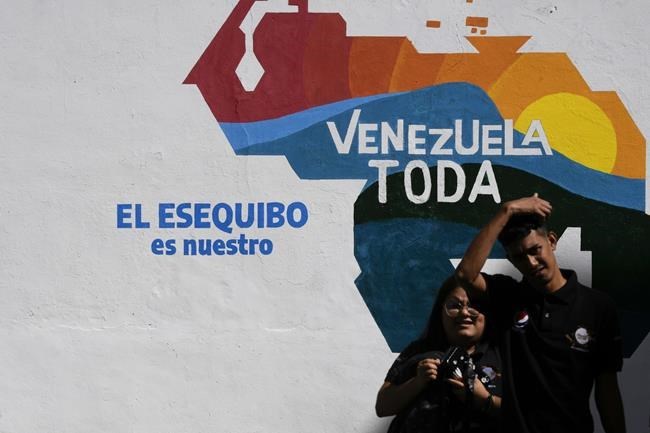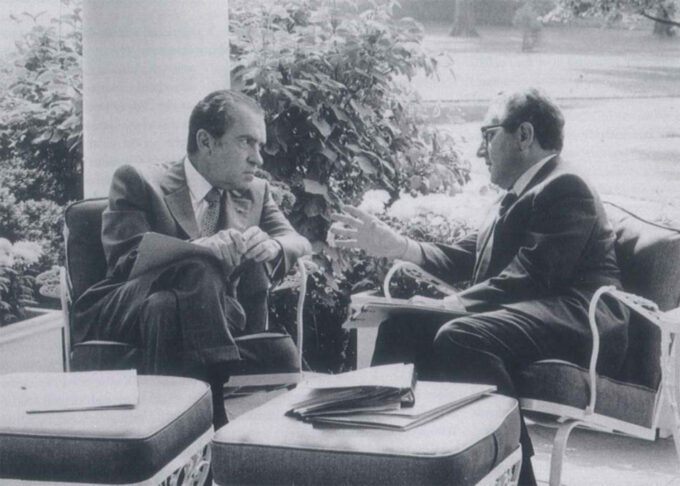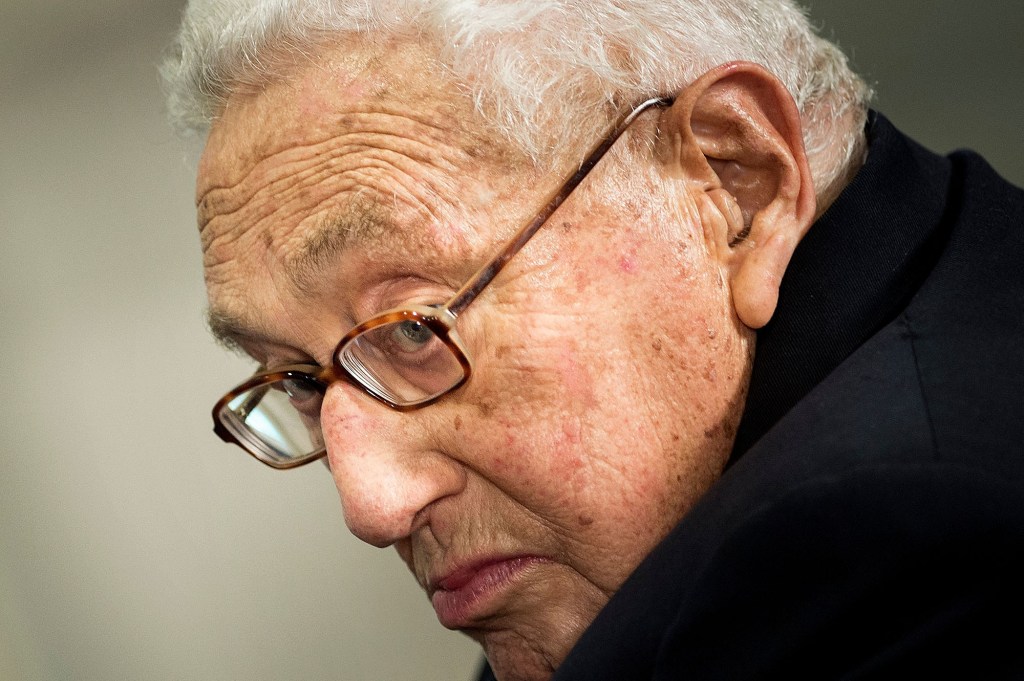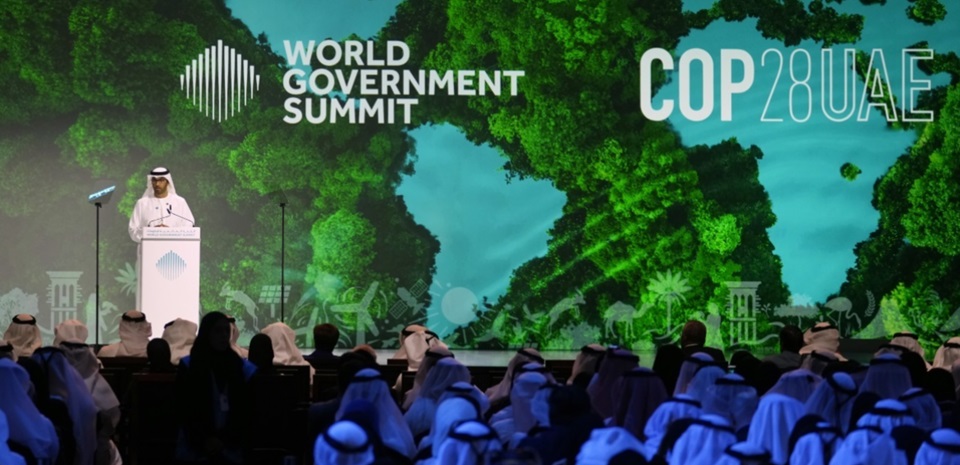
Sultan Al Jaber, the CEO of Abu Dhabi National Oil Co., speaks during the World Government Summit in Dubai, United Arab Emirates, Feb 14, 2023. | AP
This year, a united dream of a cleaner, cooler planet is being threatened by Big Oil and Gas. COP28, arguably the UN and the world’s most important environmental summit, has been “comprehensively captured by the fossil fuel lobby to serve its vested interests,” Amnesty International cautioned. Internal notes leaked by a whistleblower have vindicated their warning.
The 2023 UN Climate Change Conference is being held in Expo City, Dubai, United Arab Emirates (UAE) between Nov. 30th and Dec. 12th. An intergovernmental initiative to limit global temperature rises and curb the ramifications of climate change, this year’s summit is controversial enough given the UAE’s penchant for gas and oil expansion, but recent records have been exposed that prove the COP28 team plans to exploit the conference to further that very agenda.
COP28 President Al Jaber happens to also be CEO of the Abu Dhabi National Oil Company (ADNOC), which has recently conferred with many government and business leaders, aiming to use COP28 to ramp up ADNOC’s gas and oil exports.
The plans run utterly counterintuitive to the 2015 Paris Agreement, which is to reduce the earth’s warming to just 2.7 degrees Fahrenheit above pre-industrial age temperatures. To that end, greenhouse emissions would need to be capped before 2025 at the latest, and decline 43 percent by 2030.
Amidst the struggle to achieve this, there have been previous controversies at the hands of fossil fuel proponents, such as former Brazilian President Jair Bolsonaro’s push in 2018 to double-count carbon credits, something that would have jeopardized the integrity and potential success of the agreement’s guidelines. What will be done in Dubai, however, makes that agenda pale in comparison.
Though it is not yet clear how many COP28 meetings Al Jaber has had with foreign governments, briefings uncovered by the Centre for Climate Reporting (CCR) – and seen by the BBC – indicate he discussed commercial interests with over 30 nations. An anonymous whistleblower for the CCR verified the authenticity of the plans, which Professor Michael Jacobs, a climate politics expert at Sheffield University, called, “breathtakingly hypocritical.”
“The UAE,” he remarked, “is the custodian of a United Nations process aimed at reducing global emissions. And yet, in the very same meetings where it’s apparently trying to pursue that goal, it’s actually trying to do side deals which will increase global emissions.”
Further meeting records and internal emails uncovered by the CCR show there is very little delineation between COP28 matters and the aims of ADNOC. COP28 team staffers have noted Al Jaber’s policy that talking points from ADNOC always be included in summit discussion.
Leaks contradict denials
The team has denied the allegations, but the leaks contradict such claims, as do discussion points from meetings with officials from Saudi Arabia, Senegal, and Venezuela, which attempt to justify the plans with ADNOC’s claim that “there is no conflict between sustainable development of natural resources and its commitment to climate change.”
Other countries involved in Al Jaber’s talking points include Mozambique, Canada, and Australia, which would see “liquified natural gas” opportunities evaluated. Colombia, meanwhile, would find ready support from ADNOC for its own fossil fuel developments, documents indicated. Talking points for other countries included China, Germany, and Egypt.
According to an editorial by Morning Star, a daily newspaper in Britain, these kinds of actions are “as predictable as they are symbolic. Predictable because why else would this despotic Gulf monarchy, whose huge wealth is entirely derived from its vast oil reserves, seek to host COP28 except to greenwash an economic model utterly dependent on continuing fossil fuel extraction?
“Symbolic because the UAE’s disgraceful conduct is not out of tune with the wider approach of Western governments which hand management of a ‘just transition’ to the very corporations that profit most from the status quo.”
Kaisa Kosonen, Greenpeace International policy coordinator, commented, “If the allegations are true, this is a real scandal. The climate summit leader should be focused on advancing climate solutions impartially, not backroom deals that are fueling the crisis. This is exactly the kind of conflict of interest we feared when the CEO of an oil company was appointed to the role. COP is an opportunity to secure our survival, not to strike business deals that fuel the crisis.”
An investigation in early November by Agence France-Presse (AFP) further uncovered an “energy transition narrative” drafted for the COP28 team by consulting firm McKinsey & Company; it outlines a reduction in oil use by only half over the next 25 years. “On average, 40-50 millions of barrels per day of oil are still expected to be utilized by 2050,” the uncovered document stated. The McKinsey energy scenario, said AFP, “reads as if it was written by the oil industry for the oil industry.”
A former consultant for the firm revealed to AFP that McKinsey “serves the world’s largest polluters,” putting it completely at odds with the mission of COP28. “The firm is best understood as possibly the most powerful oil and gas consulting firm on the planet posturing as a sustainability firm, advising polluting clients on any opportunity to preserve the status quo.”
Meanwhile, further documents were later attained by the CCR that are just as scandalous; they revealed that UAE bedfellow Saudi Arabia’s plans for an Oil Development Sustainability Programme (ODSP), which involved fossil fuel collaboration with African and Asian nations, as well. The CCR said: “The investigation obtained detailed information on plans to drive up the use of fossil fuel-powered cars, buses, and planes in Africa and elsewhere, as rich countries increasingly switch to clean energy.
Wants to accelerate supersonic air travel
“The ODSP plans to accelerate the development of supersonic air travel, which it notes uses three times more jet fuel than conventional planes, and partner with a carmaker to produce a cheap combustion engine vehicle. Further plans promote power ships, which use polluting heavy fuel oil or gas to provide electricity to coastal communities.”
Mohammed Adow, head of PowerShift Africa, remarked, “The Saudi government is like a drug dealer trying to get Africa hooked on its harmful product. The rest of the world is weaning itself off dirty and polluting fossil fuels and Saudi Arabia is getting desperate for more customers and is turning its sights on Africa. It’s repulsive.”
Germany’s foreign minister, Annalena Baerbock, leader of that country’s Green Party, stated that we must “actually take stock of what we have achieved and the targets we set ourselves. We have to get out of fossil fuels, we have to dramatically reduce emissions. It is no longer about visions. It is about finally delivering on the pledges we made.”
Bill McKibben, environmentalist and leader of 350.org, concluded, “It’s difficult to imagine anything more systemically evil than this spate of bids by the oil companies and oil countries to keep wrecking the planet; it’s akin to the way that tobacco companies, facing legal losses in the U.S., pivoted to expand their markets in Asia instead. But this time the second-hand smoke is going to kill us all.”
We hope you appreciated this article. At People’s World, we believe news and information should be free and accessible to all, but we need your help. Our journalism is free of corporate influence and paywalls because we are totally reader-supported. Only you, our readers and supporters, make this possible.
CONTRIBUTOR

Blake Skylar
Blake is a writer and production manager, responsible for the daily assembly of the People's World home page. He has earned awards from the IWPA and ILCA, and his articles have appeared in publications such as Workday Minnesota, EcoWatch, and Earth First News. He has covered issues including the BP oil spill in New Orleans and the 2015 U.N. Climate Conference in Paris.
He lives in Pennsylvania with his girlfriend and their cats. He enjoys wine, books, music, and nature. In his spare time, he reviews music, creates artwork, and is working on several books and digital comics.
Perspectives
Marta Schaaf & Kristine Beckerle
29 Nov, 2023
Repressive laws, a climate of fear & imprisoned domestic dissidents – all of which characterise COP28 host country UAE – can serve no purpose other than to support defenders of the status quo, write Marta Schaaf & Kristine Beckerle.
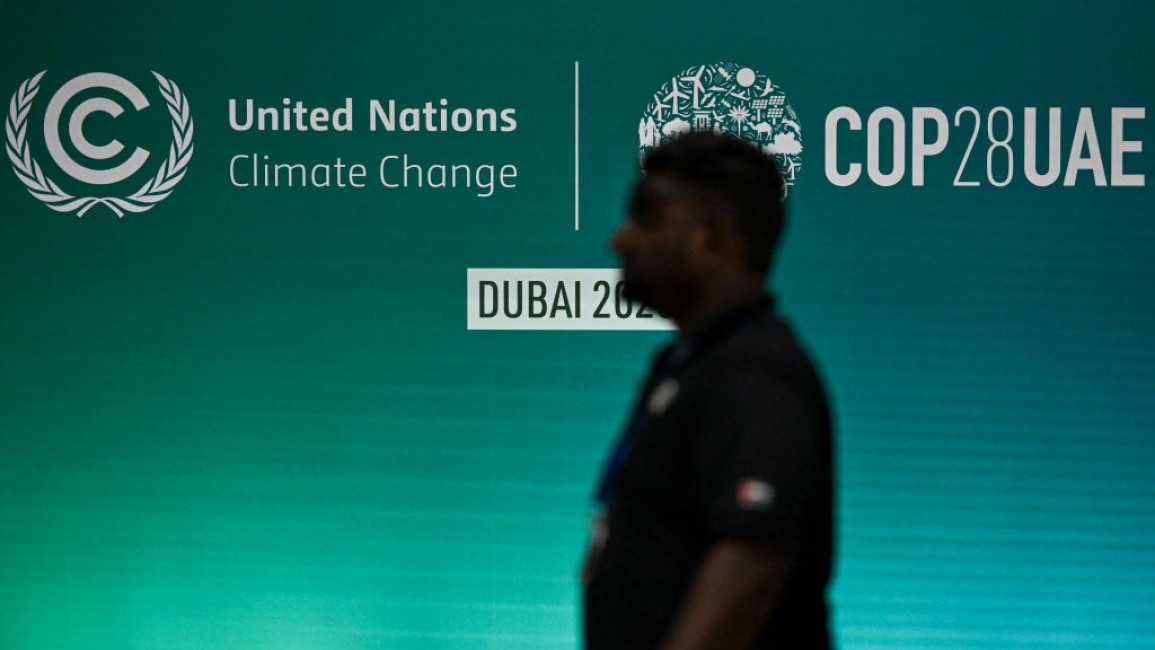
The UN chief urged world leaders to take decisive action to tackle ever-worsening climate change at the COP28 summit in Dubai. [GETTY]
To avert catastrophic climate change, an active and empowered civil society is necessary. The upcoming United Nations Climate Change Conference (COP28) in Dubai is almost certain to provide further proof that we will fail if we rely on large, powerful institutions such as governments and multinational corporations.
Fossil-fuel companies have known about their contributions to climate change since the 1970s, yet they continue to drill and expand their operations. While governments have paid lip service to the problem by adopting the UN Framework Convention on Climate Change and the Paris climate agreement, the latest Production Gap Report shows how little these commitments mean in practice. Between now and 2030, output in the top 20 fossil-fuel-producing countries will be more than double the amount consistent with limiting global warming to 1.5° Celsius.
Self-regulation by governments and fossil-fuel companies is woefully insufficient, not least because governments and fossil-fuel companies are often one and the same. For too long, both have sought to appease public concerns with greenwashing campaigns and the promise of future silver-bullet technologies such as carbon capture and storage. And when some segment of the public is not pacified by such ploys, many of these same governments and companies have been all too willing to resort to quashing freedom of expression, association, and peaceful assembly.
''The government has continued its repression in the run-up to COP28. It has cut off communication between many prisoners and their families, prosecuted Emiratis who have been deported back to the country after seeking refuge abroad, and rejected the UN’s calls to release prisoners of conscience.''
Only through collective action, advocacy, and civil-society participation in policymaking will governments be forced to do what it takes to phase out fossil fuels, support the transition to renewable energy, and protect human rights in a world of increasingly extreme weather and drought. But civil society cannot thrive without civic space – public fora where citizens can jointly criticize and pressure the most powerful, without fear or suppression. And at COP28, outside the protected confines of the UN’s “blue zone,” there will be virtually no civic space at all.
Dubai is one of the most expensive cities in the world, which means that lodging, food, and other expenses will be prohibitively costly for most people, especially the disadvantaged and marginalised who are most affected by the climate crisis. Moreover, it is illegal in the United Arab Emirates even to criticise the government, or to say anything deemed to “harm the public interest,” and foreigners are sometimes detained for comments made while in the country. Minor signs of dissent during the 2011 Arab Spring were quickly and forcibly repressed. To this day, scores of human-rights activists and dissidents remain arbitrarily detained, including 60 members of the “UAE-94,” who were tried en masse in 2013. Four years later, the UAE imprisoned Ahmed Mansoor, the only remaining Emirati working publicly to defend human rights in the country.
The government has continued its repression in the run-up to COP28. It has cut off communication between many prisoners and their families, prosecuted Emiratis who have been deported back to the country after seeking refuge abroad, and rejected the UN’s calls to release prisoners of conscience.
The UAE is also infamous for its use of unlawful electronic surveillance. Mansoor is just one of many human-rights defenders who has been targeted with spyware developed by cybersurveillance companies such as NSO Group and Hacking Team.
Such abuses are more than sufficient to create a climate of fear among activists hoping to attend COP28. While the UAE promises to make “space available for climate activists to assemble peacefully and make their voices heard,” it remains to be seen what this will look like in practice. What risks might activists still face if they speak out about the UAE’s abysmal rights record or failure to phase out fossil fuels? We do not know, because the UNFCCC secretariat and the UAE have not even disclosed the Host Country Agreement – the bare-minimum standard of transparency for any COP.
Of course, the UAE is hardly alone in its hostile attitude toward civil society. Around the world, countries are cracking down on protesters, misapplying current law to stifle climate dissent, and enacting new legislation to criminaliSe protest – often at the behest of powerful fossil-fuel companies. Some of these laws target climate activists directly, indicating that summits like annual climate-change COPs are of particular concern to repressive governments.
RELATEDPerspectivesMalak Altaeb
Despite 2023 being another year of record-setting heat and rainfall events, COP28 is unlikely to produce any meaningful outcome. That is as unjust as it is tragic. The people who suffer the most from climate change are not heads of state or fossil-fuel executives. In the UAE and around the world, those bearing the brunt of the crisis are often the same people facing discrimination, marginalisation, and a lack of basic protection from their governments.
Since it is their futures that will be discussed at COP28, their engagement, activism, and demands for accountability are essential. It is through civil society that we will expose greenwashing and achieve the solutions that have long been promised. International conferences to discuss an existential global threat will generate meaningful results only if everyone is free to criticize, gather, and peacefully demonstrate. Repressive laws, a climate of fear, and imprisoned domestic dissidents can serve no purpose other than to support defenders of the status quo.
Marta Schaaf is Director of the Program on Climate, Economic and Social Justice, and Corporate Accountability at Amnesty International.
Kristine Beckerle is Economic, Social, and Cultural Rights Adviser for Amnesty International’s Middle East and North Africa Regional Office.
This article originally appeared on Project Syndicate.
By AFP
December 1, 2023

Copyright AFP FADEL SENNA
The World Bank will “operate” an ambitious new climate change fund, but donors and recipients will likely control how the money is actually spent, the head of the development lender said Friday.
More than $400 million has been pledged initially to the new “loss and damage” fund for countries impacted by climate change since it was approved by nations attending the UN’s COP 28 climate summit in Dubai on Thursday.
The amount so far falls well short of the $100 billion developing nations say are needed to meet the costs of changing climate, but more pledges are expected in coming days.
“The reality is the bank is currently not planning to play the role of allocating the money,” World Bank President Ajay Banga told an event at the summit in Dubai.
“That will be done by a governing board that needs to be created, that should have representation from the donor countries as well as the recipient countries,” he added.
The World Bank will play a more limited role, managing the day-to-day operations of the fund, Banga explained.
“Our job is like a trustee: We run it, we operate it, we hope to make sure the money goes the right places — because we know how to do that,” he said, adding that the fund was still in its early stages.
The loss and damage fund has been hailed as a positive start to this year’s COP summit in the United Arab Emirates, which has been billed as the largest summit to date, with more than 140 world leaders due to speak on Friday and Saturday.
Climate finance has been a key sticking point, with wealthy nations most responsible for emissions not delivering on promises to support the vulnerable states who are worst affected but least responsible for global warming.
On Friday, Banga said the new loss and damage fund would initially look to help finance “technical assistance and analytics,” for countries impacted by climate change.
“If this gets done well, sometime next year is when you’ll start seeing money actually be put out to help countries on the ground,” he added.
More than 40 countries back statement saying 'net zero needs nuclear power'
:quality(70)/cloudfront-eu-central-1.images.arcpublishing.com/thenational/RLBOCRYKY2MWRDQOJ53PMEZ26I.jpg)
MOCHOVCE, SLOVAKIA - NOVEMBER 6: A general view shows the cooling towers of the Mochovce nuclear power plant on November 6, 2023 in Mochovce, Slovakia. The key to Slovakia's nuclear strategy, Unit 3 of Slovakia's Mochovce NPP, has achieved 100 per cent power. The power plant is expected to cover 13 percent of the country's electricity needs, making Slovakia self-sufficient, according to the plant's administrator Branislav Strycek, CEO of Slovenske Elektrarne.
Tim Stickings
Dubai
Dec 01, 2023
Live updates: Follow the latest news on Cop28
Nuclear power chiefs pitched fission as an indispensable clean energy source on Friday as they brought a “new momentum” behind the technology to Cop28 in Dubai.
More than 40 countries backed a statement by the International Atomic Energy Agency, the UN’s nuclear watchdog, saying reactors could help build a “low-carbon bridge to the future” and that “net zero needs nuclear power”.
Their intervention at Cop28 comes with several countries building or planning new nuclear reactors, spurred on by a desire for clean and home-grown power after a period of turmoil on global energy markets.
“Nuclear power emits no greenhouse gases when it is produced and contributes to energy security and the stability of the power grid,” said the statement read by IAEA chief Rafael Grossi.
“The responsible advancement of innovative technologies, including small modular reactors, aims to make nuclear power easier to build, more flexible to deploy and more affordable, which is of particular importance to developing countries.
“To build a low carbon bridge to the future will require that we keep the operating nuclear power plants serving us today.”
The IAEA said the statement was “a further indication of a new momentum for nuclear power as a source of reliable low carbon energy”.
Finland’s Climate and Environment Minister Kai Mykkanen, from one of Europe’s prominent pro-nuclear countries, told The National he hoped to see “technology-neutral” calls to action at Cop28 that do not exclude nuclear.
Negotiators began work on Friday on a joint "global stocktake" text agreeing a way forward on climate action, in which finding consensus on energy is likely to be particularly tricky.
“We are very happy that it seems that at an EU level, but also at a global level, we are starting to have a bit more of a technology-neutral approach also recognising the importance of nuclear,” Mr Mykkanen said.
“It’s totally unrealistic to think that we could phase out fossils and nuclear simultaneously. We need more nuclear in several kinds of solutions.”
The push for more nuclear does not only include new power stations but smaller, windmill-sized reactors that could, for example, provide heat or electricity for a remote area or industrial site.
Opponents of nuclear power object to it being put in the same category as renewables such as wind and solar, because it requires uranium fuel, produces waste and conjures fears of disasters like Chernobyl and Fukushima. Germany closed its last atomic power plant last year because of safety fears.
Pro-nuclear campaigners counter that the wind and sun do not always co-operate and that using fission reactors as an all-weather “baseload” is preferable to coal, oil and gas.
